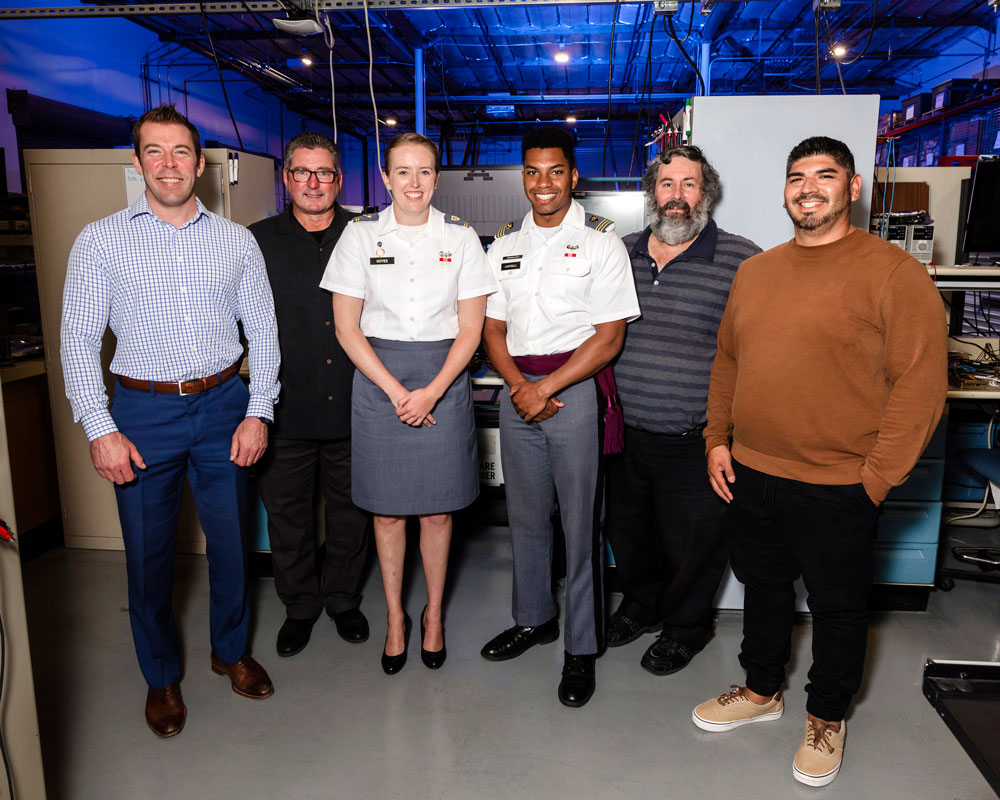Military cadets gain national security experience at Sandia

By participating in Sandia’s Military Academic Collaboration program, cadets and midshipmen from U.S. service academies gain experience for a possible future in science or engineering while performing valuable work for the nation — just ask Cadets Riley Hoyes and Nathaniel “Nate” Campbell. Both Riley and Nate are aspiring Army officers currently studying at the United States Military Academy at West Point.
“It was a really good experience,” said Nate, who is in his final year of pursuing an electrical engineering degree. After explaining that his pre-Sandia technical activities focused on analyzing numbers in the classroom, rather than for a real-life project or goal, Nate said he now felt more prepared for Army work in functional areas, such as those that apply electrical engineering to satellites or other equipment in the field.
A broad, strategic understanding of Sandia’s mission
Riley and Nate both came to Sandia as part of the MAC program. The program is designed to give military cadets practical experience with the Labs’ missions and a broad, strategic understanding of Sandia’s role in national security.
“The mission of all military service academies — providing a challenging undergraduate education that prepares future leaders by emphasizing discipline, duty, honor, country and teamwork — fits perfectly with Sandia’s creed to provide exceptional service to the nation,” explained Lance Hansen, manager of Sandia’s Exploratory Systems Technologies team and a 1988 West Point graduate who participated in a predecessor to the MAC program. “Nate, Riley and every MAC participant, by virtue of their training, understand the importance of service to a larger cause and how Sandia can fit into that dynamic future.”
Lance added that the cadets are exposed to elements of national security priorities that extend beyond their service’s specific mission. These priorities include energy, homeland security, nuclear deterrence and global security.
Meaningful projects to support the nation
MAC participants work on meaningful Sandia projects that contribute to national security. The Labs offer more than 35 project areas spanning various disciplines and skill sets, so each cadet can find a suitable match.
“Sandia’s MAC program has been around for at least 12 years and serves as a great platform and opportunity for students to gain experience and knowledge by working with world-class leaders and staff in New Mexico and California,” said MAC coordinator Gabe Serna. “Some of our MAC program leaders and mentors are former military personnel who welcome the opportunity to give back and mentor these students. It’s a win-win for everyone involved and very rewarding for me personally as the program lead.”
Both Nate and Riley attested to learning a great deal in just a few weeks at the Labs. Nate’s project focused on using a W80-1 system analyzer to test equipment.
“I tested the amplifier for eight or nine different components,” said Nate, noting that his tasks involved different resistances and voltages.
Riley, a systems engineering major, was asked to begin developing a technical history book for the Exploratory Systems Technologies department. Her first step was conducting interviews with both current Sandians and retirees. She then created an overview spread and timeline to highlight the department’s prototypes, such as the Explosive Destruction System.
“I designed a layout to show how the EDS project impacted the U.S. Army overall,” said Riley, adding that the document provided an in-depth explanation of how the EDS aligns with different Sandia portfolios, such as Global Security and Energy & Homeland Security.
New perspective on careers at the national labs
Riley said she was happy to have the opportunity to document Sandia’s long history of contributions to the nation through the eyes of the women and men who performed this work in relative anonymity.
“I learned just how much they want to tell their stories,” the cadet recalled of the interviews. “They love to talk and are very passionate about their work. This project is a great way for them to tell their stories. They otherwise would never have been asked. They were happy to provide insight on how their projects contributed to the nation.”
It was an eye-opening experience, she said.
“I was not aware of the different types of projects conducted by the national labs. When I thought of a lab, I pictured test tubes and lab coats. But [the interviewees] talked about the Labs’ systems engineering aspects, which I found to be very interesting.”
Nate said he would recommend the MAC program to his fellow cadets.
“I would definitely encourage it,” he said emphatically. “I’m not sure how long I’ll stay in the Army, but I think it’d be cool — if I decide not to make it a 20-year career — to come to a place like this where you’re still able to give service to the nation and work on something that matters.”
The MAC program is open to qualified cadets and midshipmen of any United States service academy. Watch a video about this program, or for more information, email mac-program@sandia.gov.